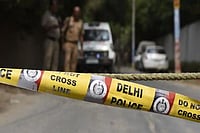In an effort to combat the escalating pollution levels in the national capital, the Delhi Fire Services has teamed up with the Delhi government to employ an unconventional solution. As part of this initiative, 12 fire engines have been deployed to tackle pollution at identified hotspots within the city. Atul Garg, the Director of Delhi Fire Services, shared that these fire tenders have already commenced the task of spraying water to mitigate the adverse effects of the ongoing pollution crisis, PTI reported.
Delhi has been grappling with a persistent toxic haze for the sixth consecutive day, pushing pollution levels into the 'severe plus category.' The deterioration of air quality is primarily attributed to unfavorable wind conditions, notably calm winds during the night. The Central Pollution Control Board (CPCB) reported a significant increase in the Air Quality Index (AQI) from 415 on Saturday afternoon to 461 on Sunday morning.
Acknowledging the urgency of the situation, Delhi Education Minister Atishi announced the extension of primary school closures until November 10, in a bid to safeguard the well-being of students. Additionally, schools for students in grades 6-12 are being given the option to shift to online classes. This decision comes in line with previous directives from Chief Minister Arvind Kejriwal, who had previously ordered the closure of all government and private primary schools in Delhi on November 3 and November 4 due to the escalating pollution levels.
As part of the national air pollution control plan, emergency measures are triggered, including bans on polluting trucks, commercial four-wheelers, and various construction activities, when the AQI surpasses the 450-mark. The AQI is a vital metric used to assess air quality, with an AQI above 450 falling into the 'severe plus' category, indicating the severe pollution crisis currently affecting the region.


























